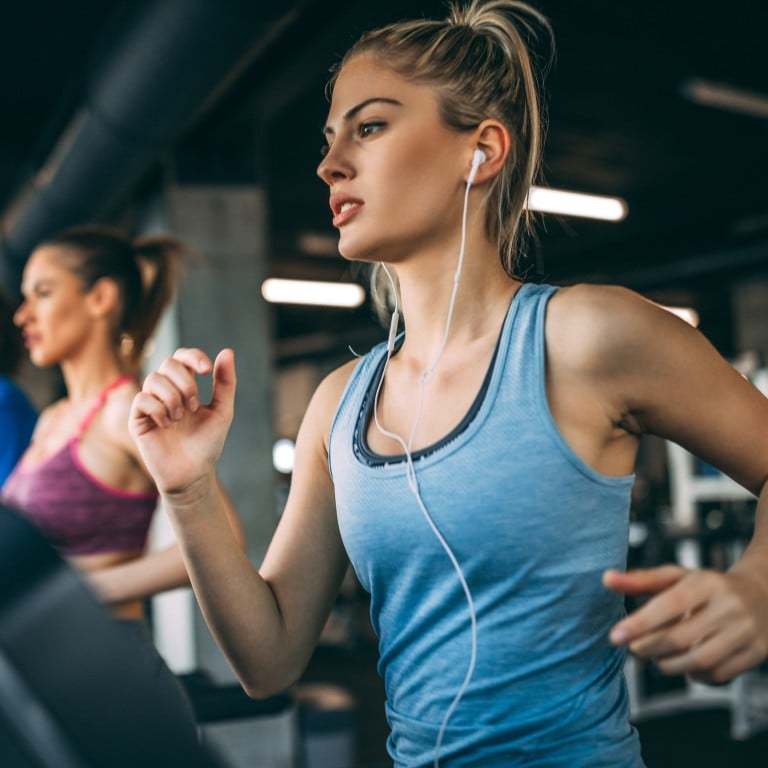
Trend of exercising in make-up is bad for your skin, study finds – your pores can’t expand to let sweat escape
- Allowing pores to expand to enable sweat to escape is important in helping the body regulate temperature during exercise, and make-up prevents that, study shows
- Wearing foundation when you work out stops the skin maintaining proper oil levels, and this can lead to clogged pores, dry skin, and acne, an expert says
Wearing make-up while exercising could be bad for the skin, and potentially lead to acne, according to new research.
While exercise is great for increasing nourishing blood flow to the skin, using cosmetics on your face while working out could do more harm than good.
Researchers at Korea National University of Education and Texas A&M University published their findings in the Journal of Cosmetic Dermatology. They describe the negative effects wearing cosmetic foundation during aerobic exercise has on the skin.
“Foundation cream, where applied, caused dryness of the skin and clogged pores, potentially leading to acne and other problems. People with dry skin conditions are most at risk,” said Dr Sukho Lee, a professor in the Department of Counselling, Health, and Kinesiology at Texas A&M University in San Antonio, Texas.
We did not expect to see the huge impact of the one layer of foundation cream on the skin after only 20 minutes’ exercise
There is a growing trend of people wearing make-up while exercising, but little research has been done on this.
A recent private sector survey of 2,201 people in the United Kingdom reported that up to 60 per cent of gym goers wore face make-up at the gym.
From wealth to health: China’s craze for fitness, and gym body selfies
The researchers hypothesised that cosmetics could block pores partially or completely and – because pores aid in evaporation, sweating and ridding skin of debris – that make-up would negatively impact skin health.
They were interested in studying teenagers at college because they do not have to remove make-up before exercise sessions.
The research team recruited 43 healthy college students, 20 men and 23 women.
The participants first washed their faces with a cleanser before researchers measured skin variables on different areas of their faces, including pore size and sebum oil production.

They then applied a chemist brand cream foundation to their foreheads and under-eye areas. The bottom half of the face was left make-up free as a control.
The students then ran on a treadmill for 20 minutes – for five minutes at 4.8km/h (3mph), 10 minutes at 6.4km/h, and five minutes at 8km/h.
Before and after the exercise, a scanning device recorded the skin’s moisture levels, oil amounts and pore size on different parts of the face.
Gym anxiety? TikTok’s ‘shy girl workouts’ could be the answer
The results were surprising.
“We did not expect to see the huge impact of the one layer of foundation cream on the skin after only 20 minutes’ exercise,” Lee says.
Moisture increased after exercise in both the non-make-up and make-up zones; but there was a greater increase in moisture in the make-up zones.
“A higher moisture level on the make-up side of the skin is evidence of poor evaporation,” he says.
Allowing pores to expand to enable sweat to escape is important in helping the body regulate temperature during exercise, particularly as heart rate and metabolism increases. The skin therefore plays an important role in releasing excess body heat.
How the state of our mind affects our skin, and what we can do to treat it
Another notable finding was that pore size increased in skin without make-up after exercise, but not significantly in skin with make-up. This suggests that wearing make-up can block pores.
Oil levels also increased in the zones without make-up, and decreased in the zones with make-up, suggesting that it may be difficult to maintain proper oil levels on the skin when wearing make-up.
Lee says the foundation may have been interfering with the skin’s ability to regulate oil levels.
“For skin health, it’s best to exercise with your make-up removed,” said corresponding author Dr Dongsun Park, of the Korea National University of Education.
The team now hopes to extend the study to include other types of foundation that contain different ingredients – such as oil-free formulations – as well as sunscreens to determine their impact on the skin during exercise.

